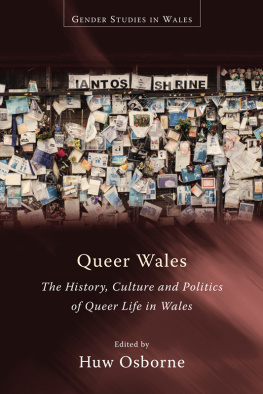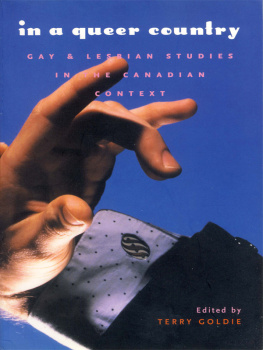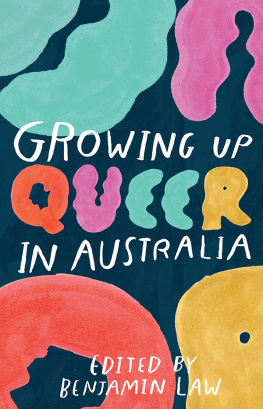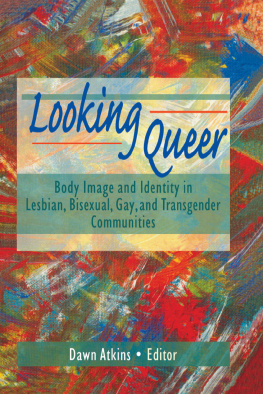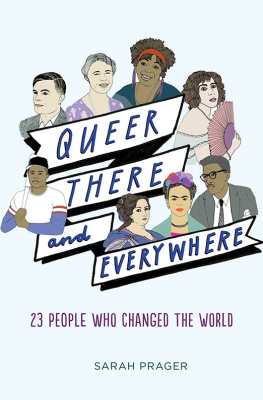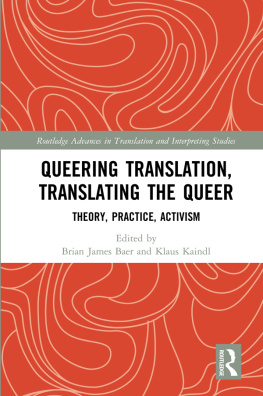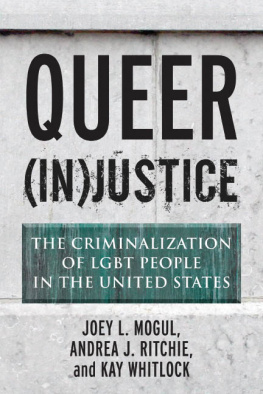About the author
Hctor Domnguez Ruvalcaba is a professor in the Department of Spanish and Portuguese at the University of Texas, Austin, where he teaches queer and gender issues in Latin American literature, film, and culture.
Translating the Queer
Body Politics and Transnational Conversations
Hctor Domnguez Ruvalcaba
Translating the Queer: Body Politics and Transnational Conversations was first published in 2016 by Zed Books Ltd, The Foundry, 17 Oval Way, London SE11 5RR, UK.
www.zedbooks.net
Copyright Hctor Domnguez Ruvalcaba 2016
The right of Hctor Domnguez Ruvalcaba to be identified as the author of this work has been asserted by him in accordance with the Copyright, Designs and Patents Act, 1988.
Typeset in Adobe Garamond by Swales & Willis Ltd, Exeter, Devon
Index by Rohan Bolton
Cover design by Andrew Brash
All rights reserved. No part of this publication may be reproduced, stored in a retrieval system or transmitted in any form or by any means, electronic, mechanical, photocopying or otherwise, without the prior permission of Zed Books Ltd.
A catalogue record for this book is available from the British Library.
ISBN 978-1-78360-293-3 hb
ISBN 978-1-78360-292-6 pb
ISBN 978-1-78360-294-0 pdf
ISBN 978-1-78360295-7 epub
ISBN 978-1-78360-296-4 mobi
Contents
I am very thankful for the help of my readersCarlos Amador, Adam Coon, Ruth Rubio, and Nat Zinggwho were generous with their time and meticulous in every paragraph. I also appreciate the suggestions and comments of the anonymous reviewers and the patience and professionalism of the Zed Books editor Kika Sroka-Miller.
This book has been the result of a long journey of conferences, symposia, edited books, political activism, and formal and informal conversations with most of the authors referenced. In this sense, this book can be considered a summary of transnational dialogues with a rich critical mass and relentless activists. The Sexualities Section of the Latin American Studies Association, the international series of conferences Queering Paradigms, and the Permanent Seminar on Gender Violence, among other meetings around the Americas, have been of vital importance in writing this volume. I cannot mention all the great people I have interacted with in the past years, but their inspiration, passion, and good sense of community are all present in these pages.
I want to especially thank the following writers, academics, artists, and activists, who kindly agreed to be interviewed: Pedro Lemebel, Juan Pablo Sutherland, Gloria Thiers, Carmen Berenguer, Gloria Careaga, Alejandro Brito, Csar Enrquez Cabaret, Violeta Barrientos, Sara Rondinel, scar Vega, Rosario Aquim, Elvira Espejo, Daniel Jones, Esteban Pauln, Osvaldo Bazn, Camilo Antilln, and Mil Vargas. Their work in politics, research, art, and journalism has been influential in the recent history of gender and sexuality in Latin America, and Im very fortunate for having had the opportunity to talk personally to all of them, as many of their ideas are central to this project.
What is the place of queerness in Latin American culture and politics? How did it become an object of academic, artistic, and intellectual conversations? What meanings does queer acquire in its translation into Latin American cultural codes? This is a study of the queer as a field located in a specific geography and culture, not as a universal notion. Translating the Queer takes the Latin American region and its cultural diaspora as a territory of political action and conversation on issues related to transgressive sexualities and body conceptions. The field of queer in Latin America includes political actions, academic agendas, artistic movements, and economic development. Additionally, the queer noun and adjective can be applied to policies, movements, fields of representation, aesthetic practices, and moral debates. Latin America as a geographic demarcation of queer involves a complex cultural dynamic in which bodies have conducted and been transformed by practices, meanings, and policies of sexuality that occur inherently to the historical processes of the region.
How gender, sexuality, and the politics of the body have been approached in Latin America in recent academic and political debates is the main focus of this work. That is, this book addresses how queer criticism and theory have contributed to Latin Americanist scholarship and how the theory has transcended the field of sex and gender studies. As we will see, the field of queer studies is specific as it focuses on the cultural implications of sexuality and the body, but it is also extensive, as it intervenes in and affects cultural processes in general. Politics, norms, tastes, economy, and language are embodied, gendered, and sexualized. My focus is to understand how this politics, semantics, aesthetics, and ethics of sex and bodies has become one of the most transgressive meaning producers in contemporary Latin American culture.
In this book, it is my ambition to offer an inquiry into how queer phenomena have been represented and defined, and how they have constituted a set of cultural and political practices. Those deviant bodily practices were there, avant la lettre , before queer theory came to academia. Queer academic discourse, as well as political and artistic movements, constructed a corpus of representations, actions, and methodologies to illuminate obscured and denied aspects of cultural history, a rewriting of history that tends to go beyond the mere academic exercise. In this book, queer is a form of understanding the politics of the body. This implies a criticism of the hegemonic culture, the legal system, and the gender structure. Queering is an understanding of the deviant as a subject of historical change in the cultural and political realms. This is a study of the troubles and contentions that take place in representations and debates on body, sex, and gender in contemporary Latin America. I chose the focus of the contention and troubles in consonance with the notion of queer as the point of destabilization, the fissure through which the order is challenged, and the point of fracture of what is considered natural, normal, or legitimate about body, sex, and gender.
Queering is a process of resignification of the conceptions and norms that control the body in Latin American culture. The distinctive conception and practice of the queer in the region will be the main object of this inquiry. What, then, are the specifics of a region that necessarily relocates the notion of queer? We can summarize, somewhat arbitrarily, the Latin American queer conversation in the following statements: a) Latin American queer studies have been undertaken in a transnational dialogue, which implies a politics of cultural translation; b) colonialism/decolonization is a tension implicit in the articulation of queer dissidences; c) queerness has been associated with modernity in most twentieth-century debates on gender and sexuality; d) queer is a methodology of critical thinking that by deconstructing the gender system questions the foundations of the nation and the state; and e) the machineries of consumption and disposability of neoliberalism complicate the processes of body liberation and queer expressions.
My primary corpus of analysis is the scholarship produced in the past three decades by academics and intellectuals writing both from within Latin America and from abroad. This insideoutside crossing describes a number of contacts, influences, and contradictions that define the queer as a conjuncture that propels a crisis of the gender system. Latin American sexgender culture and politics is an entity constructed from various cartographies and from multiple discursive and theoretical traditions. The travel of queer concepts and representational practices through the gay and lesbian research approaches, or through feminism, psychoanalysis, and sexology, has produced a rich corpus of cultural and political translation.




